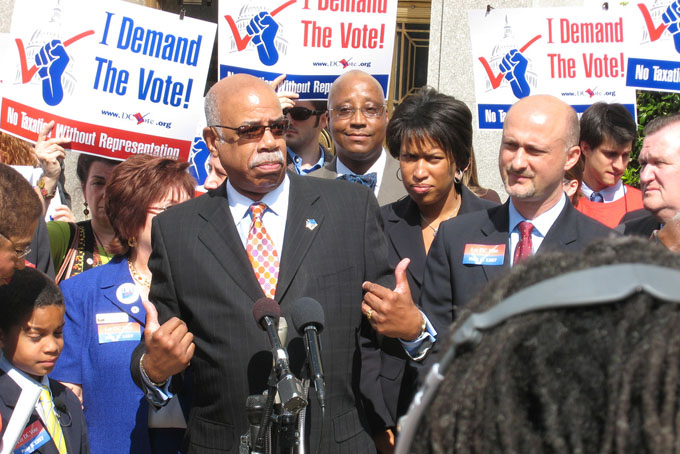
Raoul Cunningham, president of the Louisville, Kentucky, branch of the NAACP, speaks at DC Vote rally on Capitol Hill in support of S. 1257, the DC House Voting Rights Act, 17 Sep 2007. (Flikr Photo/Keith Ivey)
by Joseph Gerth
The Courier-Journal
LOUISVILLE, Ky. (AP) — Raoul Cunningham was a gangly 17-year-old high school junior when Louisville police came for him at the lunch counter of the old Stewart’s Department Store in February 1961. They handcuffed him, he says, and hauled him off to the old Children’s Center juvenile facility on East Chestnut Street.
Over the next two years, that scenario would be repeated hundreds of times as Cunningham and other African-American high school students — mainly from Central and Male — waged a battle of sit-ins, squat-ins and stand-ins against restaurants, movie houses and other businesses that wouldn’t serve them because of their race.
The discrimination not only angered him, “it made me want to change the situation,” said Cunningham, now president of the NAACP’s Louisville Chapter. “. I tried to harness that anger and do damage to the system and change it.”
Fifty years ago last week, Louisville became the first city south of the Mason-Dixon Line to pass legislation requiring businesses to serve people no matter their race, country of origin or religion.
It came after more than 27 months of near-daily protests led primarily by the teens, along with larger boycotts of downtown businesses, and a successful effort to turn City Hall over to Republicans.
“After school, we would meet, take the pledge for nonviolence, give or get marching orders and come back downtown,” Cunningham said.
Over the past five decades, Louisville largely has rid itself of such overt racism, said Carolyn Miller-Cooper, the executive director of the Louisville Human Rights Commission.
Businesses are now open to people of color. Other laws have banned discriminatory hiring practices and housing policies. And the law that required businesses to serve people of all colors and religions was amended to protect people from discrimination based on sex, disability and sexual orientation.
But Miller-Cooper said there is more work to be done as evidenced by more than a dozen complaints to her office each year alleging discrimination in public accommodations — about half involving race.
“We still get complaints, founded or unfounded,” she said. “The two areas where we see the highest percentage (of complaints) are race and disability.”